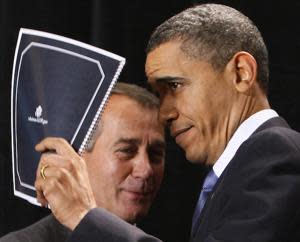 The Lookout
The LookoutDebt ceiling deal: What’s the impact on the economy, ordinary Americans?

In his announcement last night of the deal between Congress and the White House to raise the debt ceiling, President Obama declared that Washington leaders now "should be devoting all of our time" to addressing the country's broader economic woes. But the agreement could itself have a major impact on the struggling economy, if it passes Congress.
So what's the deal likely to mean for ordinary Americans?
Of course, the most important short-term impact of the plan, which would cut at least $2.4 trillion in spending over the next decade, is that the U.S. will avoid defaulting on its debt. That's unquestionably a positive. Economists had warned that a default would be disastrous for everyone, throwing world financial markets into chaos and ushering in higher interest rates for years, or even decades.
Beyond avoiding a default, the deal could potentially help kickstart the broader economy, which managed just 0.8 percent growth in the first half of the year, with unemployment at 9.2 percent, and talk of a double-dip recession growing louder.
In a memo for investors published Sunday, Mark Zandi, the respected chief economist for Moody's Analytics, called the agreement "a big plus for … the struggling economy." Uncertainty over the debt ceiling standoff, Zandi argued, has contributed to slow economic growth. "Business executives are extraordinarily nervous, and won't step up hiring until this drama is resolved," he wrote. "Employers are not going to take that leap of faith and expand, given how little faith they have that policymakers will come through in time." With the issue resolved--assuming, of course, that the deal passes Congress--that mindset could change.
Other economists say the deal will help reduce uncertainty not just over the debt ceiling, but over the larger issue of the deficit. By showing that Washington means business in addressing both problems, they argue, the agreement will lift business confidence and provide an economic boost.
But the deal doesn't just raise the debt ceiling. It also calls for $2.4 trillion in spending cuts over the next decade. And that's where the impact could be less positive. Most economists say cutting government spending when the economy is weak is likely to reduce jobs and growth by further weakening demand.
"Unemployment will be higher than it would otherwise have been," Mohamed El-Erian, the CEO of Pimco, the world's largest bond investment firm, said yesterday on ABC News. "Growth will be lower than it would be otherwise. And inequality will be worse than it would be otherwise."
By how much? It's hard to say with precision, because it'll depend on which programs get cut, and that hasn't been decided yet. But to get a rough sense, consider this: Zandi, who has worked with both Democrats and Republicans, calculated in February that the original budget passed by the House earlier this year, which cut $100 billion in spending for 2012, would cost around 700,000 jobs by the end of 2012. The deal announced last night calls for a yearly average of $240 billion in cuts over the next decade. Very roughly, that suggests the new plan would cost around 1.6 million jobs per year during that time.
Because the cuts are designed to be smaller over the next few years while the economy remains weak, then larger over the later part of the decade, that number is likely inflated. But there's little doubt the deal will mean a significant drag on employment, at a time when over 14 million Americans are already out of work.
And the consensus is that job losses are likely to outweigh the positive impact of increased business confidence. "When you look at the history of these things, the finding is that we shouldn't be kidding ourselves," Paolo Mauro of the International Monetary Fund and an expert on the impact of spending cuts, told the New York Times. "When you do fiscal adjustment in the near term, it does have an adverse impact on economic growth."
One final point that's gotten lost amid the relief over the deal: the U.S. credit rating could be downgraded anyway. Both of the major ratings agencies warned last month that they were mulling a downgrade, thanks to concerns over Washington's ability to tackle the long-term deficit problem.
Zandi judges in his memo that the debt ceiling deal will likely be enough to convince the agencies to keep the triple A rating. But investors today don't appear to be reassured: Reuters reports that there's still a "widespread assumption" that a downgrade is coming from at least one agency. If that happens, it would be harder not just for the government but for ordinary Americans to borrow money, and the stock market would likely take a major impact.
So what's the upshot? It's pretty clear that on the most basic level, the debt ceiling deal is a plus for the economy, because it keeps the country out of a disastrous default. But at least in the short term, the spending cuts that come with it could turn the task of fixing the economy and getting Americans back to work into an even steeper climb.
